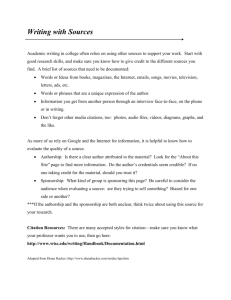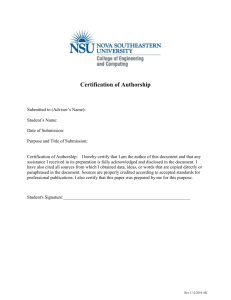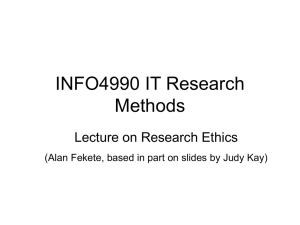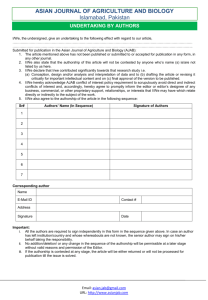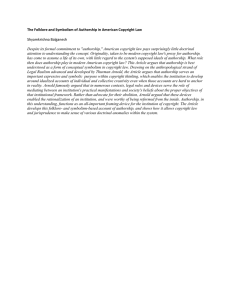Research Board
advertisement
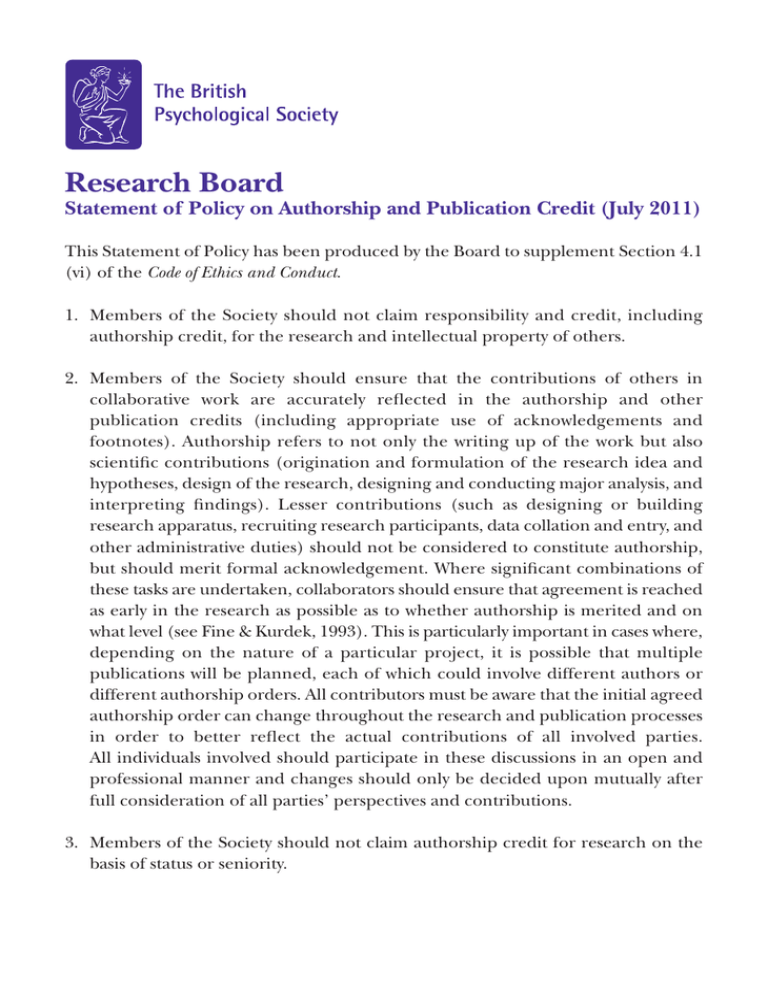
Research Board Statement of Policy on Authorship and Publication Credit (July 2011) This Statement of Policy has been produced by the Board to supplement Section 4.1 (vi) of the Code of Ethics and Conduct. 1. Members of the Society should not claim responsibility and credit, including authorship credit, for the research and intellectual property of others. 2. Members of the Society should ensure that the contributions of others in collaborative work are accurately reflected in the authorship and other publication credits (including appropriate use of acknowledgements and footnotes). Authorship refers to not only the writing up of the work but also scientific contributions (origination and formulation of the research idea and hypotheses, design of the research, designing and conducting major analysis, and interpreting findings). Lesser contributions (such as designing or building research apparatus, recruiting research participants, data collation and entry, and other administrative duties) should not be considered to constitute authorship, but should merit formal acknowledgement. Where significant combinations of these tasks are undertaken, collaborators should ensure that agreement is reached as early in the research as possible as to whether authorship is merited and on what level (see Fine & Kurdek, 1993). This is particularly important in cases where, depending on the nature of a particular project, it is possible that multiple publications will be planned, each of which could involve different authors or different authorship orders. All contributors must be aware that the initial agreed authorship order can change throughout the research and publication processes in order to better reflect the actual contributions of all involved parties. All individuals involved should participate in these discussions in an open and professional manner and changes should only be decided upon mutually after full consideration of all parties’ perspectives and contributions. 3. Members of the Society should not claim authorship credit for research on the basis of status or seniority. 4. (a) Members of the Society should ensure that postgraduate students are encouraged to claim first authorship for research arising principally from their PhD dissertation or thesis, in furtherance of (3) above. The authorship of publications arising from doctoral work should, therefore, normally be joint (with the student listed first). The supervisory input provided must, however, justify the inclusion of the supervisor as second author. In exceptional circumstances, however, where considerable revision is required beyond the capabilities of the student, it may be agreed that the supervisor be listed as first author as a result of the additional contributions made (see Costa & Gatz, 1992; Fine & Kurdek, 1993). In the event that a student does not wish to write up their work for publication; or has given consent for the supervisor to do so; the research may be used for publication with the supervisor as principal author and the student as second author. (b) Members of the Society should also give similar considerations to those outlined in (a) above to research arising principally from dissertation submitted for Masters degrees. The authorship of publications arising from this work should normally be joint. However, in accordance with the considerations outlined in (a) above, the level of supervisory input should be accurately reflected in the authorship and publication credits. (c) Such considerations should also apply in the case of research undertaken by postgraduate students undertaking professional Doctorate courses in psychology. (d) In the case of undergraduate dissertations, first authorship will depend on the relative contributions of the individuals. Consideration should be given to the independence of the research conducted by the student, with respect to the experimental design, statistical analysis and the interpretation of the results. Normally, the level of supervisory input provided should be acknowledged by the listing of the supervisor as first author (particularly if the student has elected to do their dissertation research on ‘ready-made’ projects proposed by their supervisor). Exceptionally, however, where minimal support and intervention by the supervisor has been required, the authorship of publications arising from the work should be joint (with the student listed first). References Costa, M.M. & Gatz, M. (1992). Determination of authorship credit in published dissertations. Psychological Science, 3, 354–357. Fine, M. A. & Kurdek, L. A. (1993). Reflections on determining authorship credit and authorship order on faculty-staff collaborations. American Psychologist, 48, 1141–1147.
